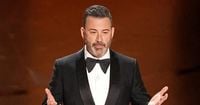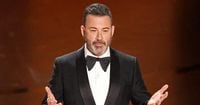Tuesday night marked a dramatic return for Jimmy Kimmel, whose late-night show, Jimmy Kimmel Live!, aired again after nearly a week of suspension that ignited a nationwide debate over free speech, political polarization, and the power of broadcast media. The controversy began after Kimmel made remarks on his September 15, 2025 episode criticizing some Republicans for their response to the killing of conservative activist Charlie Kirk. The fallout was swift and far-reaching, with the Federal Communications Commission (FCC), major broadcast groups, and even the President of the United States weighing in.
In a more than 15-minute monologue at the top of his return show on September 23, Kimmel addressed the controversy head-on. With emotion in his voice, he told viewers, “It was never my intention to make light of the murder of a young man. I don’t think there’s anything funny about it.” He added, “Nor was it my intention to blame any specific group. For those who think I did point a finger, I get why you’re upset. If the situation was reversed, there’s a good chance I’d have felt the same way.” According to NBC News, audience members described the monologue as “heartfelt” and “unifying,” with several standing ovations throughout the taping.
Kimmel’s comments about the politicization of Kirk’s death had triggered a fierce backlash. FCC Chairman Brendan Carr publicly threatened regulatory action against ABC, Disney, and Kimmel himself, a move that many in Hollywood and beyond condemned as government overreach. Carr told conservative commentator Benny Johnson on a podcast, “There’s calls for Kimmel to be fired. I think, you know, you could certainly see a path forward for suspension over this and again, you know, the FCC is going to have remedies that we could look at.”
The Walt Disney Co., parent company of ABC, suspended Jimmy Kimmel Live! indefinitely on September 17, 2025, stating, “We made the decision to suspend production on the show to avoid further inflaming a tense situation at an emotional moment for our country. It is a decision we made because we felt some of the comments were ill-timed and thus insensitive.” After days of what Disney called “thoughtful conversations” with Kimmel, the company announced on September 22 that the show would return the following night.
The suspension and subsequent reinstatement set off a firestorm. Broadcast giants Nexstar and Sinclair, who together control about 70 ABC affiliates, announced they would continue to preempt Jimmy Kimmel Live! in their markets. Sinclair said it would replace the show with local news programming and demanded that Kimmel apologize to Kirk’s family and make a donation to Turning Point USA. Nexstar echoed the sentiment, stating it would “focus on continuing to produce local news and other programming relevant to their respective markets.” As a result, viewers in cities like St. Louis, Salt Lake City, Nashville, and New Orleans were unable to watch the show’s return on traditional broadcast TV—but could still access it via Disney-owned streaming platforms such as Hulu, Hulu + Live TV, Disney+, and YouTube.
The controversy drew in President Donald Trump, who blasted both Kimmel and ABC on his social media platform before the show aired. “I can’t believe ABC Fake News gave Jimmy Kimmel his job back,” Trump wrote. “Why would they want someone back who does so poorly, who’s not funny and who puts the Network in jeopardy by playing 99% positive Democrat GARBAGE.” He also accused Kimmel of being “yet another arm of the DNC,” and hinted at potential legal action against the network.
Outside the show's Hollywood Boulevard studio, the atmosphere was electric. Protesters and supporters alike gathered, waving signs and chanting slogans. Some, like Dandidi—who called himself the “Harlequin of Liberty”—celebrated Disney’s decision to bring Kimmel back, urging onlookers to “renew your subscription. Support Disney, because they are standing up for liberty.” Others, like Perry Caravello, protested Kimmel’s return, holding signs accusing the comedian of dishonesty. Jessica Brown, a SAG-AFTRA member, collected signatures of support for Kimmel, saying, “It’s a testament of what happens when community bands together and when we’re united we can make a difference.”
Inside the studio, Kimmel balanced humor with gravity. He appeared on screen dressed as a bear, his sidekick Guillermo Rodriguez as a banana—a nod to the show’s comedic roots—before delving into the serious business of the evening. He thanked supporters from across the political spectrum, including conservative figures like Ben Shapiro, Senator Ted Cruz, and Senator Rand Paul, as well as those “in the middle, like Joe Rogan.” “Maybe the silver lining from this is we found one thing we can agree on,” Kimmel said. “Let’s stop letting these politicians tell us what they want and tell them what we want.”
Kimmel did not shy away from criticizing Disney’s initial decision to suspend him, saying, “I did not agree with that decision, and I told them that. We talked it through, and at the end, even though they didn’t have to, they really didn’t have to—this is a giant company. We have short attention spans, and I am a tiny part of the Disney Corporation. They welcomed me back on the air, and I thank them for that.”
He also reflected on the broader implications for free speech, noting, “One thing I did learn from Lenny Bruce, George Carlin and Howard Stern is that a government threat to silence a comedian the president doesn’t like is anti-American.” Kimmel recounted conversations with comedians from countries where mocking those in power could lead to imprisonment, saying, “Our freedom to speak is what they admire most about this country, and that’s something I’m embarrassed to say I took for granted until they pulled my friend Stephen [Colbert] off the air and tried to coerce the affiliates who run our show in the cities that you live in to take my show off the air. That’s not legal.”
The emotional climax of the monologue came when Kimmel praised Erika Kirk, widow of Charlie Kirk, for forgiving her husband’s alleged killer. “She forgave him,” Kimmel said, his voice breaking. “That is an example we should follow. If you believe in the teachings of Jesus, as I do, there it was. That’s it. A selfless act of grace. Forgiveness from a grieving widow. It touched me deeply, and I hope it touches many.”
Not everyone was able to watch the show’s return live. Kimmel joked, “We are still on the air in most of the country, except ironically for Washington, D.C., where we have been pre-empted. We are off the air in Nashville, New Orleans, Portland, Oregon, Salt Lake City and St. Louis, where none of my wife’s family is able to watch the show tonight. So sorry, Aunt Sharon, sorry, Aunt Marie, you’ll have to go to YouTube.” Clips from the show quickly appeared online, and the show’s YouTube channel saw a surge in views, with Kimmel’s monologue approaching a million hits within hours.
The return of Jimmy Kimmel Live! has become a flashpoint in the ongoing battle over free expression, media responsibility, and political influence in America. As the dust settles, one thing is clear: the conversation about where the lines are drawn in public discourse—and who gets to draw them—is far from over.


